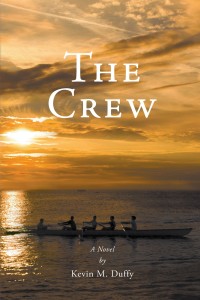Posted by Erin Duffy, Nonfiction Editor for Issue 4.1
I’ve wanted to go into publishing for years. I imagined myself in a bustling metropolitan setting, attending corporate meetings, with piles and piles of manuscripts as far as the eye can see. But if there’s anything I’ve learned in the last year or so, it’s that that image makes up only a small fraction of the publishing industry: however big and powerful the major publishing houses may be, there are just as many rewarding opportunities –for writers and aspiring editors alike—in smaller corners.
My first experience with small press was actually quite indirect. Last year, my father published a novel entitled The Crew. It was his first venture into the literary world in any capacity: my father is an engineer with a military background, but nonetheless, he spent the last ten years or so writing a novel about life in the US Merchant Marine Academy in his spare time. The finished product was a whopping seven hundred-page book with nowhere to go. So, after at least two rewrites (and plenty of pestering from me), he began to seriously look into getting it published.
quite indirect. Last year, my father published a novel entitled The Crew. It was his first venture into the literary world in any capacity: my father is an engineer with a military background, but nonetheless, he spent the last ten years or so writing a novel about life in the US Merchant Marine Academy in his spare time. The finished product was a whopping seven hundred-page book with nowhere to go. So, after at least two rewrites (and plenty of pestering from me), he began to seriously look into getting it published.
The first roadblock presented itself immediately. “Basically, I learned that if you wanted to go to a big publishing house, you had to have an agent,” my father told me recently. “And I wasn’t sure how to go about getting one. It’s almost like being an actor, where you need an agent to get auditions for you. But it’s still a matter of whether or not [the agent] would be willing to take you on as a client.”
My father’s analogy wasn’t too far off the mark. Many publishing houses don’t accept unsolicited manuscripts, and they almost always want to speak to a literary agent first rather than to the authors themselves, especially if the author is unpublished. Finding an agent was essentially an extra audition process that my dad didn’t want to bother with.
So instead, he turned to a little company by the name of Page Publishing.
 The company was run by a small group of editors who personally evaluated each manuscript they received, no agents required. When they agreed to publish my dad’s book, they sent back detailed notes concerning grammar, organization, plotlines— you name it. Throughout the revision process they were in constant contact with him– they even consulted him on ideas for the cover art. With smaller presses, there is a stronger element of creative control for the authors. It’s not so much about the bottom line as it is about helping writers share their stories with the world.
The company was run by a small group of editors who personally evaluated each manuscript they received, no agents required. When they agreed to publish my dad’s book, they sent back detailed notes concerning grammar, organization, plotlines— you name it. Throughout the revision process they were in constant contact with him– they even consulted him on ideas for the cover art. With smaller presses, there is a stronger element of creative control for the authors. It’s not so much about the bottom line as it is about helping writers share their stories with the world.
“Realistically, there are so many good stories out there,” my father said, when I asked him if he ever regretted not trying for a bigger publisher. “I look at my story, and I say, is this a New York Times Bestseller? No, but it’s still a good story. Whereas the smaller houses take a look at your story and decide if you’re worth publishing – they take a risk on your work. I would’ve had a hard time getting published by the big publishing houses. But I did get published, and Page Publishing helped me do that.”
This is, I think, one of the most valuable aspects of smaller presses. However much I respect and aspire to work for companies like Random House, Simon and Schuster, and HarperCollins, they are, at the end of the day, corporations, and corporations have to make a profit. This isn’t the case in smaller presses: whether it’s a small company like Page Publishing or a literary magazine like Gandy Dancer, the focus is on a manuscript’s potential as a story, rather than its potential as a sellable product. The publishing process is more personalized with a focus on helping writers establish themselves.
I still want to work for a corporate publisher. But I also find myself checking out the new releases of indie publishers alongside the big-name houses. I’m often just as intrigued by the unpublicized writers as I am by the New York Times Bestsellers these days.
